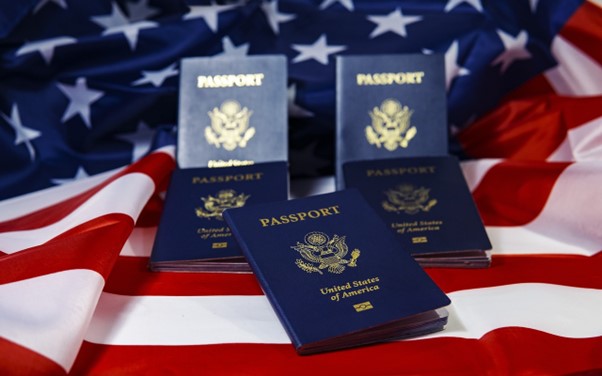Kerry is Crown’s Director of Sales and Customer Success for the UKI, Nordics and European region based in Prague.

Kerry joined Crown in 1994 in Dubai and has lived in various countries around the world. Kerry is an expert in relocation and understands the challenges faced when moving.
1. What visa will you need?
Before you embark on your journey, thoroughly research the visa options available to British citizens wanting to live and work in the USA permanently. Consider visa requirements and processing times or the application process for the green card (permanent residency).
Based on U.S. immigration law, there are two categories of visas: immigrant and non-immigrant. Immigrant visas are issued only to eligible foreign nationals intending to live permanently in the country.
British citizens can stay in the U.S. permanently if they hold an immigrant visa or green card, however they can only stay temporarily if they have a non-immigrant visa or no visa at all. British citizens who wish to stay in the U.S. for more than 90 days could be eligible for a non-immigrant visa. With a non-immigrant visa you can enter the U.S. temporarily. The validity of a non-immigrant visa varies from 3 months up to 10 years, depending on your chosen visa. Many non-immigrant permits can also be extended beyond their original validity.
Many U.S. non-immigrant visas can be used to live, work, study or join family members in the USA. The most common non-immigrant visas include:
- K3 Visa for Spouses of U.S. citizens – valid for two years, can be extended in two-year increments
- K1 Visa for Fiancés of U.S. citizens – suitable for up to 90 days
- H1B Visa for speciality workers – ideal for three years, can be extended up to 6 years
- F1 Visa for students – valid for the duration of your studies
For British nationals to stay in the U.S.A indefinitely, they will need to become a lawful permanent resident of the USA. To do this, they must get an immigrant visa, a Green Card. The USCIS usually caps the immigrant visa categories yearly, meaning the application process can take years.
The application process for a non-immigrant visa is usually quicker, and you can still apply for an immigrant visa when in the U.S. on a non-immigrant visa. For this reason, many British citizens choose to apply for a non-immigrant visa before their immigrant visa, reducing the time they must spend outside of the United States.
British nationals can be eligible for a range of Green Cards, including a number of employment-based Green Cards and family-based Green Cards.
Acquiring a Green Card is usually necessary for British citizens who wish to become U.S. citizens or hold dual nationality.
An important note to remember is that no matter which way you have been granted entry into the USA, British citizens cannot overstay their entry, regardless of whether they hold a British passport. Overstaying your permitted entry into the United States can have serious repercussions, including your ability to return to the United States again. If you overstay for over 180 days, you can re-enter the U.S. for three years. If you overstay for over a year, you will be barred from re-entry for ten years.
Prepare Important Documents: Gather and organise all essential documents, such as passports, visas, academic transcripts, and medical records. Having these readily available will streamline your immigration process and other administrative tasks.

2. Healthcare insurance – what do you need to know?
Healthcare in America can be expensive, so securing health insurance coverage is vital before you move. Research various health insurance plans available to ex-pats and select one that covers your needs and budget.
If you are planning to move to the U.S., you will be keen to understand the situation regarding you and your family’s healthcare. Whilst the U.S. government does not require you, as a new emigrant to the U.S., to obtain a health insurance plan, the cost of health care is very high, so it is recommended to obtain health insurance. There is no universal healthcare. The U.S. government does not provide health benefits to citizens or visitors. Any time you get medical care, it has to be paid for.
If you are moving to the USA to work, then your employer may provide health insurance in the form of Employer-Sponsored Insurance.
This is an avenue if you are moving to the U.S. with your current employer and will potentially ensure that you and your family receive the necessary health insurance as part of your benefits package.
Health Insurance providers will be the primary option in a healthcare plan if you cannot gain employee-subsidised insurance. A range of providers are available, and you must select one that suits your financial situation. Often the health insurance you can afford dictates the healthcare you receive as this will dictate which hospitals and doctors are available to you, so it is essential to choose this wisely. Some cities and states may also offer specific healthcare programmes for new arrivals, so it will be worth checking the local resources available.
Most hospitals in the U.S. are private organisations, and the level of healthcare is very high. The advantage of personal medical care is shorter waiting times and access to world-class doctors and medical technology.
It’s worth noting that the high cost extends to buying medicines at pharmacies, and whilst access to pharmacies is plentiful, you will want to keep your receipts to bill back to your insurance provider.
It is important to note that unless it is an emergency, and even when a U.S. hospital could turn you away if you don’t have healthcare insurance.

3. What is the best way to move your belongings?
When considering moving your belongings from your current home to America, there are many factors, such as the number of items, custom clearance, whether you can use the items in America, budget, and timeline. These are all essential points to consider. Start planning your move early to avoid any last-minute stress. Create a detailed moving plan, including logistics, packing, and necessary paperwork.
A popular route is to select an international moving company, such as Crown Relocations, specialising in overseas relocations. It will ensure your peace of mind as they specialise and assist with the packing, shipping and customs procedures taking one more thing off your to-do list! Companies such as Crown Relocations can also help calculate the cost of your move so you can ensure you plan which items you wish to take with you and those you will leave behind.
Other points to consider are to declutter and pack wisely. Will you require everything in America? Consider selling or donating any items you may no longer need.
The best approach many people who relocate take is to research their options online and ensure plenty of planning for a smooth relocation process. Prioritise what to take and declutter items you don’t need. Consider packing essential documents and valuables in a separate, easily accessible bag for the move.

4. How will you manage your finances in America?
Moving to America can involve significant expenses, from visa application fees to travel and initial living expenses. Create a detailed budget and set aside sufficient funds to cover these costs and any unexpected expenses during your relocation.
You must open a bank account before you travel or when you arrive. It may only be possible to open an account after moving as American banks will typically require you to be a resident in the country before considering opening an account.
This means you’ll need to visit the bank in person, and you will need to provide a Personal ID, i.e. a copy of a valid passport, driver’s licence, proof of address, identity documents, immigration documents, and a government-issued reference number (ITIN number) to progress your bank account application. For some banks, however, this is not always the case, and there are other options;
You can open a bank account online before leaving or over the phone before you move, so it is best to contact the chosen institution for more information, so you have the relevant information. Remember that you will need to provide banks with proof of your identity.

5. How will you find somewhere to live when moving to America?
Secure Accommodation in Advance: Arranging suitable housing before moving is essential to ensure a smooth transition. Research different neighbourhoods and housing options in your chosen destination, considering factors like proximity to work, amenities, and safety.
Whether you plan to rent or buy, explore different neighbourhoods, and consider factors like proximity to amenities, work, and public transportation.
Research the Cost of Living: Be prepared for the cost of living in America; it can vary depending on the region: research housing costs, utilities, groceries, and other essentials to budget accordingly.
Renting is usually the preferred option when first moving. This will ensure you can try several different housing types or locations to suit your needs.
Start by researching the area you plan to move to; you will find plenty of websites offering all property types and rental periods. While plenty of free websites can assist your process, you can also work with an estate agent, although as they tend to specialise in finding people homes to rent and buy, there is often a fee involved. Typically, this will be a month’s rent paid as a commission.
Start planning your move early to avoid any last-minute stress. Create a detailed moving plan, including logistics, packing, and necessary paperwork. Stay Legal and Compliant: Ensure you follow all legal requirements, such as registering with local authorities, updating your address, and renewing your visa or residency permit when needed.

6. Is childcare expensive in America?
In general, childcare costs more in the U.K. than in the U.S. The U.K. has some of the highest childcare costs of any country – over 23 per cent of the average monthly earnings of two adults, compared to 13 per cent of the average monthly payments of two adults in the USA.
Daycares are typically available from 7 am to 6 pm but can vary. Some cities in the USA have daycares where you can take your children for just a few hours. State governments license home-based daycares and daycare centres. This means they check if the daycare is safe or not.
Daycare centres specialise in the care of infants through preschool-aged children, although some daycares also offer before-and after-school care for school-aged children.
If you are moving to the USA for work and have a family, check if schooling or childcare is a benefit in your contract. If not, ensure that the childcare you choose is affordable and covers the needs you require.
When making a move from the U.K. to the USA, ensure you;
- Familiarise Yourself with American Culture: Adapting to a new culture can be exciting but challenging. Take the time to learn about American customs, traditions, and social norms to ease your integration into society.
- Network and Connect: Building a support network in America can significantly enhance your experience. Reach out to ex-pat groups, join professional associations, and attend community events to meet like-minded individuals and make new friends.
- Evaluate Job Market and Opportunities: If you’re moving to America without a job secured, research the job market in your field of expertise, and review if the planned location suits that specific field. Leverage online job portals, LinkedIn, and networking events to meet with potential employers and explore job opportunities.
- Embrace Flexibility: Moving to a new country involves adapting to changes and unforeseen circumstances. Be open to embracing flexibility and maintaining a positive attitude as you navigate the transition. Consider more than one location and be open-minded.

Moving to America from the U.K. is an incredible opportunity for growth and new experiences. These top tips can set you up for a successful and enjoyable move.
From understanding visa requirements to embracing American culture and making meaningful connections, each step plays a crucial role in shaping your journey. Patience and preparation are vital in making the most of this unique experience. Embrace the adventure and let your move to America become a memorable chapter.
Crown Relocations UK will be your reliable moving partner.